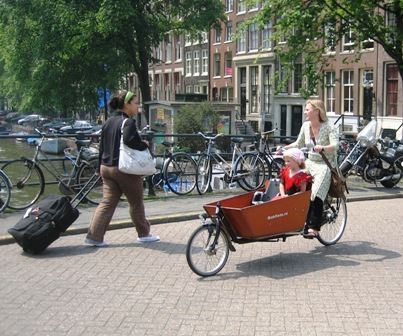
Day by day: physical activity can be designed into daily living
Edition number 49; dateline 26 January 2012
Finding hope in familiar failings
The sport, leisure and culture sector’s relationship with the health sector has always been characterised by a modicum of uncertainty. On the one hand, sport, leisure and culture has been keen to remain steadfast in its conviction that all the many and varied services it provides – from sports pitches and children’s play to national galleries and natural greenspace – have intrinsic value as part of the nation’s collective quality of life. On the other hand sport, leisure and culture has viewed health, a sector that is confident of its position at the centre of national policy and is funded on a scale to match this political status, as a potentially powerful ally in its own continuous hunt for resources and influence.
While keen to be seen to be confident of its own validity, the sport, leisure and culture sector has earnestly and eagerly tried to make a convincing case for the contribution that it can make to health promotion and preventative medicine. Give us a tiny fraction of your budget, goes the argument, and we will deliver long-term results that will demonstrate the practical and financially beneficial value of investment in what we do; a sort of ‘build it (for us)’ and ‘they won’t come (to you)’ scenario.
The evidence in support of the efficacy of sport, leisure and culture is widely respected within the health sector and, not surprisingly, it is an issue that The Leisure Review has visited regularly. Most recently Dr William Bird’s presentation to the 2011 Sport and Recreation Association (they’ll still be the CCPR to us for a while yet) saw a medic presenting the case as if to an audience of medics. If we had a drug that was as effective as physical activity, he argued, only an idiot would not prescribe it. And yet this idiotic behaviour, as defined by a highly respected medical practitioner with a nationally recognised standing in the field of health promotion, continues across the NHS.
We are left to conclude that the attempts by the sport, leisure and culture sector to find some purchase within the health sector have met with little success. We could speculate on the reasons for that – not having a properly functioning national representative professional body for best part of a decade (a situation that may well be continuing depending upon your views and your sources) will not have helped; nor will the declining sports participation figures following years of ambitious projections and confident talk from politicians and senior sports figures – but we are, as Brailsford puts it so succinctly, where we are. While the flawed ambitions and misguided implementation of the London 2012 legacy may yet prove to be the final nail in the prospect of any attempts by sport, leisure and culture to get its hands on some health-related support, we still have to try.
However, as Charlie Foster explained to The Leisure Review for this issue, all may not be lost. It seems that the short-term approach to politics, previously berated ad nauseam on this page (see TLR editorials passim), which has done so much damage to our nation never mind our sector, has brought itself to bear within the health service. General practitioners are now required to operate their practices as quasi-autonomous business units, a process that is currently being expanded by the current government to the confusion of all concerned. Under the new structures GPs’ prescribing habits are more likely than ever to be driven by economic self-interest; and an economic self-interest with a short attention span to boot.
Under this system sport, leisure and culture still has to make its case and make it to a different health audience: local or regional GP practices rather than national policy-makers. On the one hand we’re back where we started but with a different set of problems and even further away from a feasible set of solutions. On the other, we’re still making a case for sport, leisure and culture but this time it is about health’s funding rather than ours. Where once sport, leisure and culture assumed that medics would be central to persuading central policy-makers to fund their services, now sport, leisure and culture can appeal directly to health providers, making an appeal based on simple economic self-interest.
This new approach may well require sport, leisure and culture professionals (and whoever currently purports to represent them) to master a new set of skills and a new set of data. It may also mean that we are no closer to national politicians recognising the simple truth that sport, leisure and culture is good for health and good for the National Health Service. But it does offer sport, leisure and culture in all its guises – from cricket to canasta – a new approach and, given the success we’ve had with the old approach, that feels like progress.
Jonathan Ives
Editor
The Leisure Review interview with Charlie Foster is available in the February 2012 issue.
letter from the editor
The Leisure Review editorial
